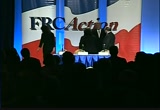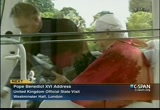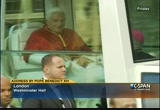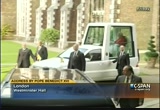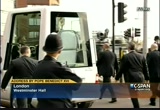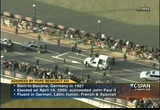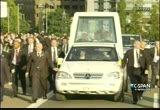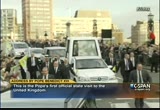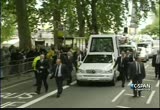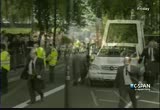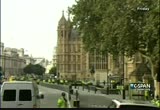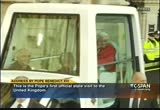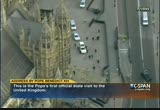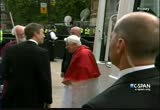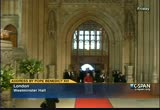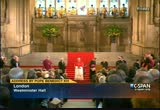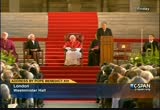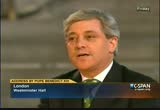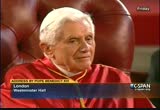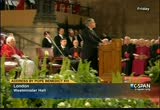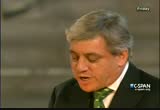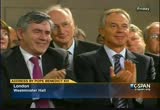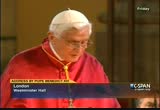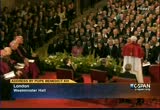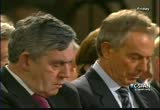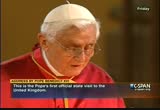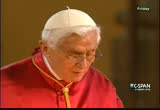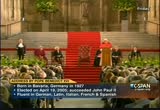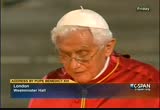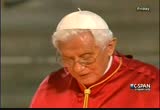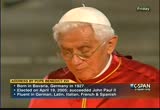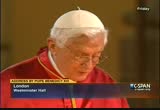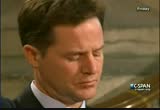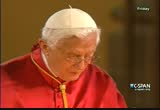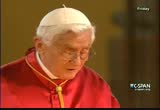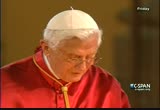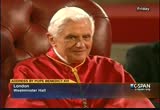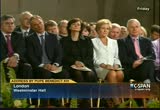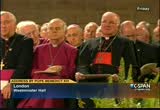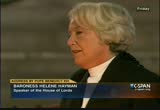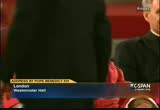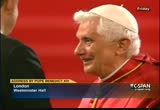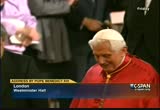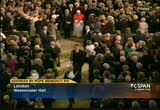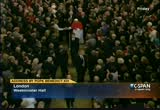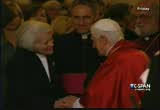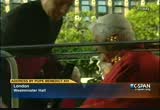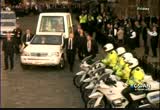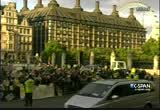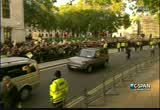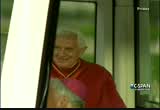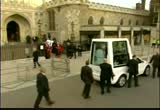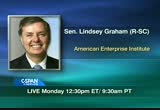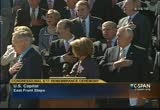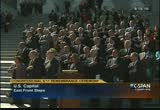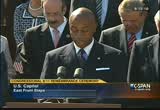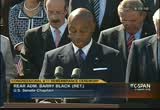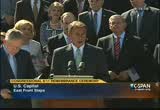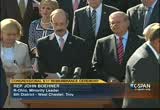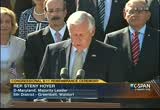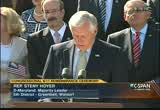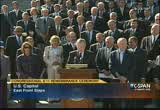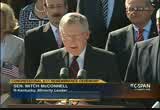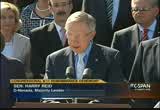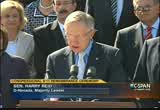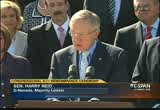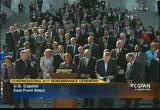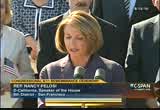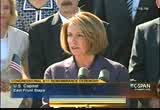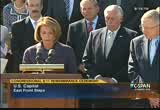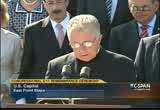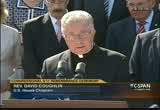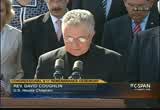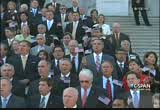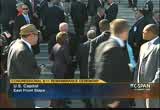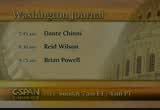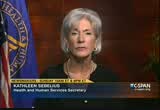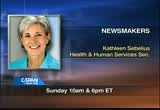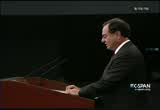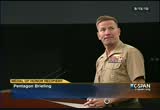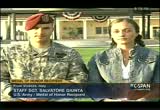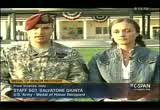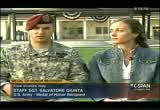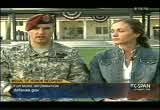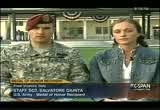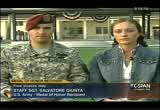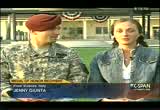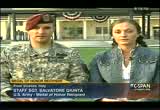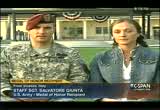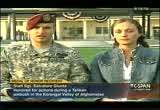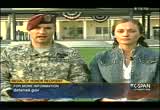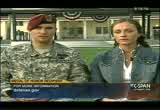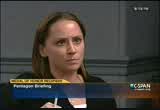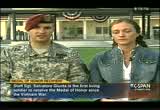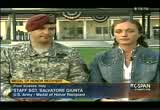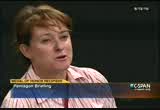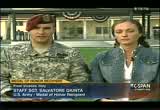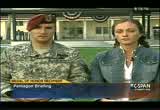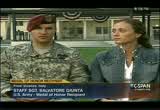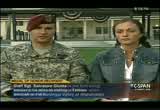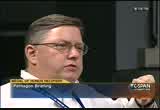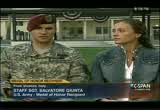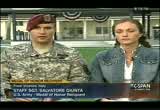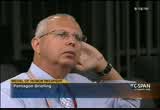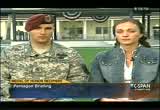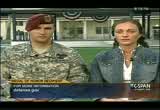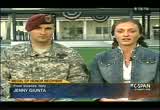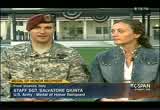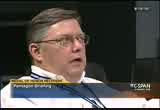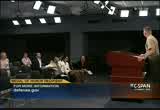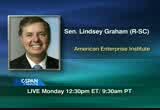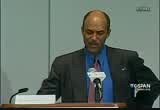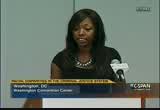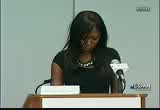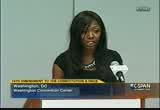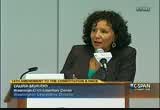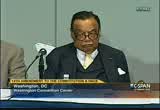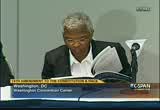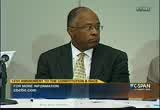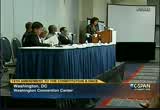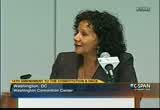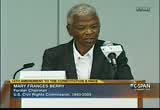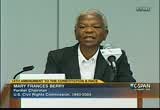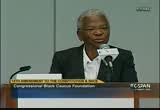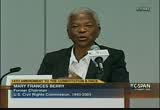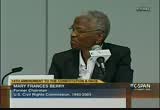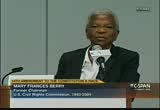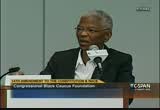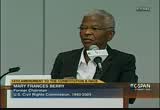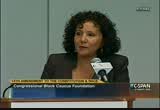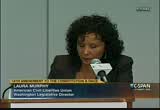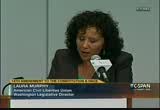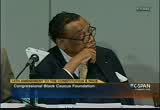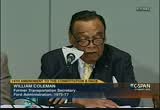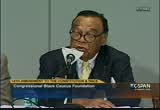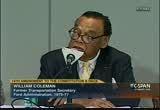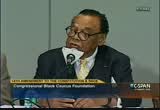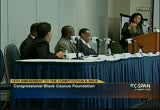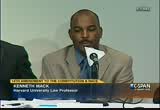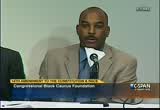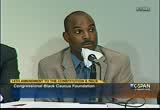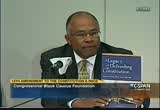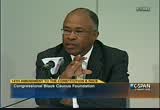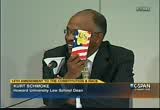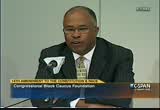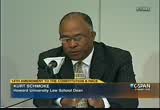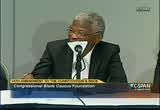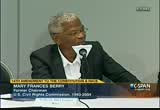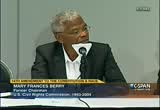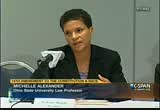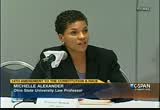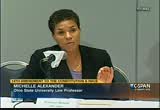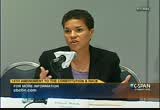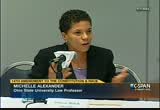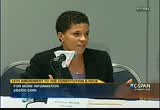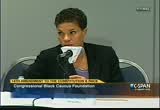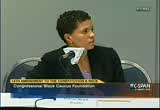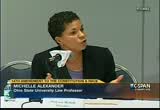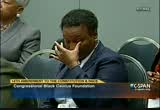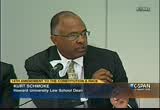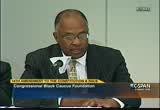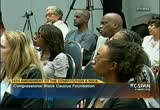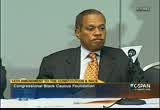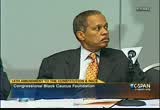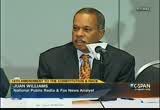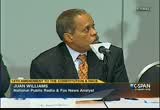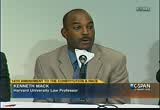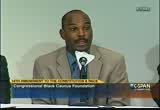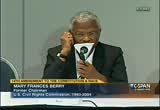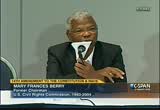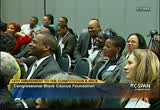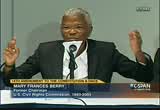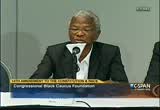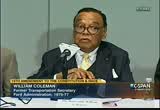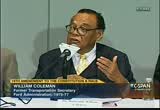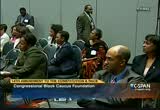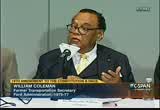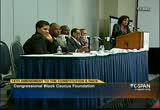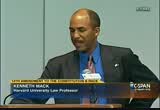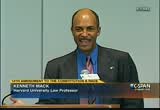tv American Perspectives CSPAN September 18, 2010 8:00pm-11:00pm EDT
8:00 pm
♪ >> tonight, on c-span, pope benedict's address on his first official visit to the united kingdom. also, are members of the 9/11 attacks. then, the medal of honor recipient at a pentagon briefing. later, a discussion on the history of the 14th amendment. pope benedict xvi addressed members of parliament on his first official state visit to the united kingdom. he stressed the need for christians to work together and bring a greater sense of virtue into public discourse. he also cited the global financial crisis as an example of the absence of strong ethical foundations in economic policy.
8:15 pm
8:16 pm
it is the first time that the pontiff has visited this place, a fact that he alone invests today with deep historical significance. it is a measure of the distance we have come and of the dialogue which we have created over the past few decades. in years gone by, it would have been inconceivable, but it can occur in seem entirely natural. this is the oldest structure of its kind in europe in the home of many memories. it is inevitably associated with trials and condemnation to death, as was the fate of sir thomas more, one of my 156th predecessors as speaker of the
8:17 pm
house of commons. and of king charles i, long after considered a martyr by many anglicans. yet it would be a mistake to think of westminster hall only in these terms when it has been as much the stage for robust debate as it has been for sheer intolerance. that tradition of debate has roots far deeper than those of contemporary democracy. it was here in 1374, for example, that the notable discussion took place between 3 religious thinkers -- a franciscan, a dominican, and the benedictine -- on the precise relationship between the papacy and the temporal affairs of their kingdom. suffice to say that no consensus was reached on that occasion.
8:18 pm
nevertheless, it is right to ask such questions in to deliberate on the merit -- and to deliberate on the merits of such arguments. there is a wide range of views on ethical disputes. as is well known, the house of commons and the house of lords, over decades, have taken positions on social, scientific, and sexual issues which are markedly different from those of the vatican. it is surely right to have robust but respectful debates within parliament, between our institutions, and throughout civil society. a very difficult past in the turbulent present need not be a
8:19 pm
barrier -- and a turbulent present need not be a barrier to an enlightened future. those of us privileged to serve society as a selective representatives -- as its elected representatives are rise to be reminded of the relationship between church and state. we are conscious of a healthy tension in this relationship as we seek to do our business. your presence, most holy father, adds to the rich tapestry of the past, and provides further reason for the many hundreds of thousands of people who come here every year to contemplate the character of this building and what has been witnessed in it. faith is not a relic either in political discourse or in modern society. it is embedded in its fabric.
8:20 pm
warned of the greeting extended by her majesty yesterday to the of the greeting extended by her majesty as today to the holy father was noticeable. many elected members of parliament, members of the house of lords, and numerous others this -- numerous other distinguished guests, on behalf of everyone here, i warmly welcome you and invite you to address us. [applause]
8:21 pm
>> mr. speaker, thank you for your words of welcome on behalf of this distinguished gathering. as i address you, i am conscious of the privilege afforded me to speak to the british people and their representatives in westminster hall, a building of unique significance in the civil and political history of the people of these islands. allow me also to express my esteem for the parliament which has existed on this site for centuries and which has had such a profound influence on the development of participative government among the nations, especially in the commonwealth and the english- speaking world at large. your common law tradition serves as the basis of legal systems in many parts of the world and your particular vision of the respective rights and duties of the state and the
8:22 pm
individual, and of the separation of powers, remains an inspiration to many across the globe. as i speak to you in this historic setting, i think of the countless men and women down the centuries who have played their part in the momentous events that have taken place within these walls and have shaped the lives of many generations of britons, and others besides. in particular, i recall the figure of saint thomas more, the great english scholar and statesman, who is admired by believers and non-believers alike for the integrity with which he followed his conscience, even at the cost of displeasing the sovereign whose good servant he was, because he chose to serve god first. the dilemma which faced more in those difficult times, the perennial question of the
8:23 pm
relationship between what is owed to caesar and what is owed to god, allows me the opportunity to reflect with you briefly on the proper place of religious belief within the political process. this country's parliamentary tradition owes much to the national instinct for moderation, to the desire to achieve a genuine balance between the legitimate claims of government and the rights of those subject to it. while decisive steps have been taken at several points in your history to place limits on the exercise of power, the nation's political institutions have been able to evolve with a remarkable degree of stability. in the process, britain has emerged as a pluralist democracy which places great value on freedom of speech, freedom of political affiliation and respect for the rule of law, with a strong sense of the
8:24 pm
individual's rights and duties, and of the equality of all citizens before the law. while couched in different language, catholic social teaching has much in common with this approach, in its overriding concern to safeguard the unique dignity of every human person, created in the image and likeness of god, and in its emphasis on the duty of civil authority to foster the common good. and yet the fundamental questions at stake in thomas more's trial continue to present themselves in ever- changing terms as new social conditions emerge. each generation, as it seeks to advance the common good, must ask anew -- what are the requirements that governments may reasonably impose upon citizens, and how far do they extend?
8:25 pm
by appeal to what authority can moral dilemmas be resolved? these questions take us directly to the ethical foundations of civil discourse. if the moral principles underpinning the democratic process are themselves determined by nothing more solid than social consensus, then the fragility of the process becomes all too evident -- herein lies the real challenge for democracy. the inadequacy of pragmatic, short-term solutions to complex social and ethical problems has been illustrated all too clearly by the recent global financial crisis. there is widespread agreement that the lack of a solid ethical foundation for economic activity has contributed to the grave difficulties now being experienced by millions of
8:26 pm
people throughout the world. just as every economic decision has a moral consequence, so too in the political field, the ethical dimension of policy has far-reaching consequences that no government can afford to ignore. a positive illustration of this is found in one of the british parliament's particularly notable achievements -- the abolition of the slave trade. the campaign that led to this landmark legislation was built upon firm ethical principles, rooted in the natural law, and it has made a contribution to civilisation of which this nation may be justly proud. the central question at issue, then, is this -- where is the ethical foundation for political choices to be found?
8:27 pm
the catholic tradition maintains that the objective norms governing right action are accessible to reason, prescinding from the content of revelation. according to this understanding, the role of religion in political debate is not so much to supply these norms, as if they could not be known by non-believers -- still less to propose concrete political solutions, which would lie altogether outside the competence of religion, but rather to help purify and shed light upon the application of reason to the discovery of objective moral principles. this corrective role of religion vis a vis reason is not always welcomed, though, partly because distorted forms of religion, such as sectarianism and fundamentalism, can be seen to create serious social problems themselves.
8:28 pm
and in their turn, these distortions of religion arise when insufficient attention is given to the purifying and structuring role of reason within religion. it is a two-way process. without the corrective supplied by religion, though, reason too can fall prey to distortions, as when it is manipulated by ideology, or applied in a partial way that fails to take full account of the dignity of the human person. such misuse of reason, after all, was what gave rise to the slave trade in the first place and to many other social evils, not least the totalitarian ideologies of the twentieth century. this is why i would suggest that the world of reason and the world of faith, the world of secular rationality and the
8:29 pm
world of religious belief, need one another and should not be afraid to enter into a profound and ongoing dialogue, for the good of our civilisation. religion, in other words, is not a problem for legislators to solve, but a vital contributor to the national conversation. in this light, i cannot but voice my concern at the increasing marginalisation of religion, particularly of christianity, that is taking place in some quarters, even in nations which place a great emphasis on tolerance. there are those who would advocate that the voice of religion be silenced, or at least relegated to the purely private sphere. there are those who argue that the public celebration of festivals such as christmas should be discouraged, in the
8:30 pm
questionable belief that it might somehow offend those of other religions or none. and there are those who argue -- paradoxically with the intention of eliminating discrimination -- that christians in public roles should be required at times to act against their conscience. these are worrying signs of a failure to appreciate not only the rights of believers to freedom of conscience and freedom of religion, but also the legitimate role of religion in the public square. i would invite all of you, therefore, within your respective spheres of influence, to seek ways of promoting and encouraging dialogue between faith and reason at every level of national life. your readiness to do so is already implied in the unprecedented invitation extended to me today. and it finds expression in the
8:31 pm
fields of concern in which your government has been engaged with the holy see. in the area of peace, there have been exchanges regarding the elaboration of an international arms trade treaty. regarding human rights, the holy see and the united kingdom have welcomed the spread of democracy, especially in the last 65 years. in the field of development, there has been collaboration on debt relief, fair trade and financing for development, particularly through the international finance facility, the international immunization bond, and the advanced market commitment. the holy see also looks forward to exploring with the united kingdom new ways to promote environmental responsibility, to the benefit of all. i also note that the present government has committed the united kingdom to devoting 0.7%
8:32 pm
of national income to development aid by 2013. in recent years it has been encouraging to witness the positive signs of a worldwide growth in solidarity towards the poor. but to turn this solidarity into effective action calls for fresh thinking that will improve life conditions in many important areas, such as food production, clean water, job creation, education, support to families, especially migrants, and basic healthcare. where human lives are concerned, time is always short -- yet the world has witnessed the vast resources that governments can draw upon to rescue financial institutions deemed too big to fail. surely the integral human development of the world's peoples is no less important. here is an enterprise, worthy
8:33 pm
of the world's attention, that is truly too big to fail. this overview of recent cooperation between the united kingdom and the holy see illustrates well how much progress has been made, in the years that have passed since the establishment of bilateral diplomatic relations, in promoting throughout the world the many core values that we share. i hope and pray that this relationship will continue to bear fruit, and that it will be mirrored in a growing acceptance of the need for dialogue and respect at every level of society between the world of reason and the world of faith. i am convinced that, within this country too, there are many areas in which the church and the public authorities can work together for the good of citizens, in harmony with this parliament's historic practice of invoking the spirit's guidance upon those who seek to
8:34 pm
improve the conditions of all mankind. for such cooperation to be possible, religious bodies -- including institutions linked to the catholic church -- need to be free to act in accordance with their own principles and specific convictions based upon the faith and the official teaching of the church. in this way, such basic rights as religious freedom, freedom of conscience and freedom of association are guaranteed. the angels looking down on us from the magnificent ceiling of this ancient hall remind us of the long tradition from which british parliamentary democracy has evolved. they remind us that god is constantly watching over us to guide and protect us. and they summon us to acknowledge the vital
8:35 pm
contribution that religious belief has made and can continue to make to the life of the nation. mr. speaker, i thank you once again for this opportunity briefly to address this distinguished audience. let me assure you and the lord speaker of my continued good wishes and prayers for you and for the fruitful work of both houses of this ancient parliament. thank you and god bless you all. [applause]
8:36 pm
[applause] >> your holiness, it is my privilege today to thank you on behalf of everyone here, parliamentarians, and non- parliamentarians alike, for your presence at westminster and for the way in which you have spoken to us about issues that are important and challenging to assault -- us all. you spoke with great generosity about the united kingdom and about the westminster parliament.
8:37 pm
its contribution over centuries to the fight for human rights and for justice. we are enormously grateful for those generous words. you spoke, too, about the role of faith in contemporary society. in the house of lords, we much appreciate the religious voices that take part in the essentially political debate. those religious voices come from the most reverent bishops, of course, and from members of other faiths as well -- jews, muslims, hindus, sikhs -- and they take their place, along with the views of those who do not come from faith backgrounds or communities.
8:38 pm
and it is that diversity of voices that instills in us that ethos so central to parliamentary debate -- and respect and the ability to listen to those divergent views, an issue which you have stressed so much in your visit here today. but, for me, perhaps the most important and long standing thing that i will take from what you said was the need for an each andoundation, as every one of bus approaches the complexities and the difficult issues -- one of us approaches the complexities and the difficult issues facing us and the world today.
8:39 pm
the seeking of that at the goal dimension -- ethical dimension, the need to needa moral -- the need to have a moral approach based on fundamental about us, that is a challenge for each and every one of us, whatever our backgrounds or beliefs. your visit has been a privilege for all of this -- your holiness, it has been a privilege for all of us to listen to you today. it has been a truly memorable occasion. we hope he will visit the united kingdom -- your visit with the united kingdom will be equally memorable for you. once again, our thanks and best wishes for the rest of your visit to this country.
8:51 pm
[captioning performed by national captioning institute] [captions copyright national cable satellite corp. 2010] >> denied, congressional leaders commemorate the 9/11 terrorist attacks. after that, the medal of honor briefing. later, a discussion on the history of the 14th amendment. >> for me or anyone else who is considering continuing on in public service, i think the real question is, do you have a vision -- a positive vision for the direction the country should go? do you have a demonstrated set of experience to show that you can get that done? >> outgoing gov. tim pawlenty on a potential presidential run, growing up in minnesota, and his time as governor -- sunday on c- span. >> monday on c-span, republican senator lindsey graham is the
8:52 pm
keynote speaker at a forum on terrorism posted by the american enterprise institute. live coverage begins at 12:30 p.m. eastern on c-span. on the east side steps of the u.s. capitol, congressional leaders commemorated the ninth anniversary of the 9/11 terrorist attacks. speakers include democratic and republican leaders, as well as the new york city mayor bloomberg. congress was on recess -- in recess on the actual date. this took place after they returned. it is 20 minutes. >> we're especially pleased today that the mayor of mayor bloomberg new yorkmayor -- mayor of new york, mayor bloomberg, is with us. please join us in singing the star spangled banner at the marine band leads us.
8:53 pm
8:54 pm
and the home of the brave ♪ >> we will now have the invocation by dr. barry black, chaplain of the united states senate. >> let us pray. lord god almighty, creator and sustainer of the universe, we thank you for this opportunity to honor the memory of september .1, 2001 may our gratitude to you for your sustaining providence motivate us to strive for unity and to develop a greater
8:55 pm
awareness of the fragile nature of our lives. lord, teach us to number our days that we may have hearts of wisdom. continue to comfort those for whom the date, september 11th, sadnesss a sense of and loss. console those whose lives are shocking with tehe images of that season of distress. inspire our citizens to inclined their hearts to you in prayer and repentance as they remember that righteousness exalts a
8:56 pm
nation, but that sin is a reproach to any people. in the days to come, do for us and this land we love exceedingly, abundantly, above all that we can ask or imagine, according to your power working in and through us, we pray in your sovereign name. amen. >> amen. >> each year at this time we have a solemn responsibility to remember the heroes and the victims of 9/11. we also keep faith with the loved ones of the fallen, and
8:57 pm
not just today, but every day. for many of us, the timeline of that tuesday is committed to memory -- the shock and grief still echoing in our hearts. we can still recall our awe for the first responders who ran into birding buildings and the ordinary citizens who charge -- into burning buildings and the ordinary citizens who charged the cockpit of flight 93. we remember and organize care packages. our resistance as a people is drawn from the courage of our heroes and the compassion of our citizens. it threw our thoughts and prayers, we can heal. with faith in he who watches over us and blesses the land that we love, we can remind ourselves, "never again."
8:58 pm
>> st. paul wrote, "we fix our eyes not on things that are seen, but on things unseen. for what is seen passes away, but what is unseen endures." as long as we live, at each september, we will mark an anniversary of loss, of the day we saw monuments of the power and pride turned to dust, of the day so many we loved were taken from us in almost an instant, a day of fear and anger that is becoming, with time, a day of remembrance and resolved. nothing can ever make that loss eholr. -- loss whole. the ideal that raised those
8:59 pm
buildings up and shaped the lives of those who died there, in this nation of liberty, where each of us has the right to think, speak, pray as we choose, in this nation of law, in this peerless nation, what is unseen endures. in the heroism of firefighters and ordinary airline passengers, in the solidarity of the stricken nation that submerged its divisions, we saw the proof -- no violence can shake the ideals that define us. we remember that today. memory is not enough. when we call america and nation of equality, a land of opportunity, and a home for every faith, we also take gone willingly the work of preserving those values and passing them down unharmed.
9:00 pm
they endure only because we choose that they endure, only because we defend them, live for them, argue for them in a struggle of ideologies, not just of arms, only because in our conduct on days of remembered as weordinary day's alike, make those truths seen. that is what indoors, and their memory will also ensure -- that endures, and their memory will also ensudure.
9:01 pm
>> we gather in this place of national purpose to honor those who lost their lives on 9/11, to show the world that we have not forgotten their sacrifice, and to remind ourselves that we must never shrank from defending the ideals that connect us to them and that will forever unite us as a people. the men and women who were targeted that they were doing nothing more than going about their lives. they showed a heroism that has inspired many other americans to countless acts of bravery over the years in places like afghanistan and iraq.
9:02 pm
in the memories of the men and women of 9/11, and those bev have lost their lives since then fighting the hateful ideology that cause did -- caused it, we remember the name of freedom. september 11th will always be a sad day for our nation, but it will also be a day when americans drawn new inspiration, new courage, and a new resolve to fight and to prevail in the struggles that lie ahead. >> like so many other americans, lieutenant colonel carol wagner woke up that tuesday, picked up her briefcase and went to the office. another man packed his suitcase
9:03 pm
and went to the airport. a day that started like any other day and it's like no other we had seen before. -- and did like no other we had seen before. as evening fell, congress came to these steps and hand in hand, we sang "god bless america." we still raise our solemn voices as one. in the years that have passed we have got often about the first responders that active and heroically. we think about the civilians that aseven acted instinctively and became heroes. we think about -- the civilians that acted instinctively and became heroes. we think about the volunteers and everyone who was here that day. they will forever remember seeing the smoke.
9:04 pm
colonel wagner was in her office. she was a daughter of nevada. she played guard on the women's basketball team, but she was most interested in guarding her country. she graduated from an rotc program and spent the next 17 years in the army. she ran a personal services branch at walter reed. she got her job at the pentagon one month before it was attacked. barbara andrews was a french and german teacher. she came east that week to visit relatives and to dance at a wedding. she was supposed to be going back to las vegas to celebrate a birthday.
9:05 pm
there is a high school where she founded the club to help students understand different cultures. they have written the phrase, "we will never forget the," in three languages, three times in her memory. neither nevada nor the nation will forget either of them or the others we have lost. today we gather on this side of the river and remember what happened on the other side of the river, and in new york, and in pennsylvania, and once again we stand united and determined on these steps. we know we would not be standing here without the courage of american heroes. as we mourn, we know what it is to be thankful.
9:06 pm
>> each year, we have a special remembrance of the thousands who perished nine years ago in new york city, here in washington, and in pennsylvania. every year we come together on these steps and across the country to reconnect to the spirit of unity we felt in the days after the horrendous terrorist attack. on the clear morning of september 11th, 2001, america stood in shock that the tragedy that unfolded at ground zero. on that day, we stood in all of the brave firefighters and our first responders to ran into the twin towers to save the lives of others. that evening, we stood on these steps to sing. time will never dimmed the memory of those we lost that day, but today and every day we
9:07 pm
pray that the passing of time has eased the pain for the families of the 9/11 victims. in one of his earliest speeches, abraham lincoln spoke of the silent artillery of time. we pray for comfort for those who lost so much. the 9/11 families turned their grief into action to keep the american people say. they deserve our deepest gratitude. they remain in our daily prayer is. we pray for the memory of those we lost. we remember the families and their grief. we are grateful to those who worked to save lives, and we rededicate ourselves to the value that makes our country great, freedom, equality, and opportunity. may god bless the memory of the victims of september 11th. may god bless their families. may god bless america. it is now my privilege to
9:08 pm
introduce the mayor of new york, mayor michael blumberg. -- bloomberg. >> remember, reflect, rebuild. that is what we have been doing for nine years. i am here to set thank you to america, the people from all 50 states to have helped us do that, and to commit that we will not forget our obligation to work with the rest of the country to care for those who came to our aid first as a rescue mission, and much too rapidly as a recovery mission. we will not hesitate to educate our children and our grandchildren that our freedoms are fragile and that the young men and women fighting and dying overseas let us continue to speak and pray the way we want to live. we will not forget ever.
9:09 pm
>> thank you, mr. mayor. we are honored by your presence. please join us as we come together in a moment of silence to honor the memory of that september 11th. the chaplain of the house of representatives will now lead us in benediction. >> lord god, the events of 9/11 awakened a sleeping giant. while violence shook the whole
9:10 pm
earth with uncertainty and anger, this wounded healer learned to speak softly, move slowly, so scarred and second on the body -- so scars and sickness on the body would never be forgotten. so blessed are we with military heroes, liberators, nation builders, first responders even to this day. once, saw less powerful because pockets were torn and spears were trapped -- fault less powerful because pockets were torn and spears were snapped, we thought perhaps war was over. people came together connected like family and heard, "be still, and know that i am god, supreme among the nations, supreme among dearthe earth."
9:11 pm
refusing to rely on passions, terrorism would be sought out and destroyed. so the giant shed the cloak of hatred and became a bloodshed place for unity of hope and lasting values. lord, this awakened giant stand here today representative of free people who realize that the stony heart has been removed with it paralyzing in different and divested and fears -- in ivisive e and davi fears. we invite others to acknowledge you as our source of blessing
9:12 pm
and joined today in our sorrow. amen. >> thank you. as we did nine years ago, when we gather then sang, "god bless america," let us all join together and call on god to continue to bless america. ♪ god bless america, land that i love. stand beside her, and guide her, through the night with the light from above. from the mountains to the prairies, to the oceans white god bless america,my
9:14 pm
>> coming up, a medal of honor recipient at a briefing. after that, a discussion on the history of the 14th amendment. later, pope benedict xvi addresses members of parliament and is first official state visit to the united kingdom. tomorrow, a discussion about wall street's take on at the midterm elections. the discussion of successful candidates to have tea party support. that is live at 7:00 a.m. eastern here on c-span.
9:15 pm
sunday, health and human services secretary kathleen sebelius talks about what could happen to the current health care legislation if republicans win control of the house. >> they could do some serious harm to what has now begun, which is a major change in the roles of the road, so the power is beginning to shift from insurance companies to consumers and back to doctors and their patients. we announced this week these major consumer protections which will finally be in place that have been talked about for decades. companies will not be able to rescind policies anymore, dump somebody on to the market because they got sick and they found a technical error. they will no longer be able to say to the parents of a child with a pre-existing condition,
9:16 pm
we are not going to cover your child at all or we are not going to cover the treatment your child needs to get better. they will not be able to stop treatment because somebody had a lifetime cap, and while that applied to a small number of people, the other sometimes life-and-death situations. we have a focus on well less, which providers are thrilled about, because too often people skeps screenings and mammograms. they do not get all of the vaccines for their kids. i think what republicans will be faced with is taking those benefits away. they will have to face their constituents who have their children enrolled in a family plan and say, that cannot happen any longer. >> you can see the entire interview with kathleen sebelius sunday at 10:00 a.m.
9:17 pm
eastern and 6:00 p.m. eastern on c-span. >> this staff sgt is the first living soldier awarded the medal of honor since vietnam's. a white house ceremony is scheduled for october 6th. next, he briefed reporters from a military base in italy. this is 30 minutes. >> the staff sergeant and his wife are joining us. as you know, president obama
9:18 pm
will present him with the nation's highest military honor, the medal of honor. thank you for being available to us. before turning this over to questions, i just want to say on behalf of all of us here at the pentagon, how proud we are of you and how proud we are of your colleagues and comrades. i just wanted to say that it is an honor for me to be able to introduce you. we will begin the questions.
9:19 pm
>> i understand you do not have a statement to make. you just want to jump into questions. >> i think that will be best. >> can you tell us about how that patrol, how it began, what time of day it was, what kind of equipment and weapons you're carrying, and lead us up to the point where the taliban attack your unit? like any other day in afghanistan. we are all soldiers. we were all out on a mission. this mission and the titular was a multi-day mission. -- this mission in particular was a multi-day mission. of october in afghanistan.
9:20 pm
it is called in the morning and night -- cold in the morning and cold at night. gets warm in the daytime. overwatch the second platoon down in the village below us as they entered the village to try to engage the elders and let were there for them. that simply, we set up on the ridge line above the village provide security for them down into the village and also provide security for ourselves. we dead at 360. 360. it was about to do our what to get set up at our location. we set out before dawn. and
9:21 pm
brought basic inventory weapons -- platoon weapons. team radius and so we could all stay that we could all stay . we were picking up chatter about the enemy setting up. they were going to do something. i was told that in afghanistan you could expect to hear that true or not. waiting for them. were trying to engage them. on you but it going to change the mission. the
9:22 pm
engaged the villagers. they came out into the village. the sun was going over the mountain. night was falling. helicopters above us flying covering us, covering ground. we were preparing to move out so we were breaking down. we were giving hand and arm signals, letting everyone know to happen. there is always a specific order of a movement that we are moving in. the first out first, followed by his gunpowder -- his then buy
9:23 pm
9:24 pm
9:25 pm
we were set up so that if the enemy ran into our perimeter we , but we did not use anything all day. i had everything i left in the with. i had it all that night. >> can i ask you and your wife what the last week has been like for you? have you seen any reports of your reaction to president to you? can you describe what that was like? warning to happen, so i was
9:26 pm
at his office. it was intense. it was exciting. i was really, really proud. i am always proud to be with him. i am proud to be his wife. i was emotional, of course. and setting motions for those who -- sad emotions for those who were lost. was a very intense moment. the past week has been exciting, intense. it has been busy, busier than usual, of course. i am sorry. i did not hear you. this last week has been a wild and crazy
9:27 pm
ride. it has been exciting. soldier, as is a new world under these lights with these cameras, talking with an ear piece. it is definitely interesting and exciting. >> having had some time to reflect, does it seem seraile? what kind of emotions can you describe since the time of the ambush? have you been sleeping or running on adrenalin?
9:28 pm
>> bid has been almost three years. not something i really until this last week. -- emotions, after i found out i would receive the medal of honor is bittersweet. such a huge, huge honor. is deployed. doing the same thing, everything that is asked of them all over again. says, i everyone who has been by me every time i needed them. really my brothers in arms. the army now. of them are in afghanistan now. ,
9:29 pm
does bring back a lot of memories of all of the people i would have loved to share this moment with, and i am not going have that opportunity because they're no longer with us. they gave everything for their , and in doing that, we are not going to be able to enjoy this together. >> the president took an hour- and-a-half of questions on monday. not once in those 90 minutes was the war in afghanistan ever mentioned, even by the president or any of the 20 people the last tim questions. -- who asked him questions. how do -- you deal with this apparent weariness of what is there?
9:30 pm
>> i think for a lack of interest or weariness, for all of the people who did not speak think there are millions more americans to do understand what the american soldier is going through. doing it now, but at the same time, i am so proud to say was there. i am still proud to say battle hard. i am proud that they're out there doing it again. if other people do not know, hopefully they will listen to this and remember that there are men and women out there every day giving everything for country.
9:31 pm
>> i would ask jenny the same question. >> i feel the same way that he does. deployed, and would call family, called friends, talk to people. there were those who were aware things and those who were not aware of things. just how sometimes it happens. to keep thinking that there are more people out there that are aware of the then maybe you are talking to. you just have to keep that in mind. hopefully they will spread the awareness and this award will spread the awareness as well. >> he mentioned that this award
9:32 pm
is bittersweet. have you spoken to any of the other soldiers that were with you that night? do you still keep in touch with the family members of any of the soldiers who were lost that night? them reached out to feelings about your honor? ? i talked with my squad leader at the time knew was there that i talked with my squad there that night. he told me that he is there for me and he is proud of me. happy for me, and that means a lot of the guys. honestly, hearing him say that to me, someone i look up to telling me this, it means a lot to me, especially that he can
9:33 pm
say that from the guys too. they are the heroes right now. they are out there fighting the enemies of the united states while i am just sitting here. bittersweet and the soldiers that were lost at night, i keep in touch with josh brennan's father. he is a real stand-up guy. i like mike a lot. talk off and on. loss. back, but i wish it was under
9:34 pm
different circumstances. married and reception in iowa summer. down and he with his brother. it is always good to see him. >> i just wanted to follow up a little peppebit. there have been very few medals of honor awarded for the war in afghanistan. people argue that it is a different kind of war with more technology, obverses world war ii, for example. i just wanted to get your take on that, being the only living
9:35 pm
recipient of such a tremendous honor. i am also curious as to what the reaction has been among your fellow soldiers there in italy. going back to what i was , in this job, i am only mediocre. i am average. this is a situation we were put into, and by no means dead i do anything that anyone else would not have done in that situation. looking at it as a picture, i was just one brush stroke in that picture, and everyone else just one brush stroke. what i did was not the first brush stroke or the last brush best. just another brush strokes that helped complete this picture, this moment in time.
9:36 pm
the guys here are proud of me. it means a lot. this is a huge, huge honor, but they know that and i know that. convey to the world how great the average is. you are sitting here talking to me, so you must think that, and i think that about them. it means a lot to say that, and hopefully more people will start thinking about afghanistan or the men and women better of what they're doing. they're raising their families different country, trying to improve the country, whether it be handing out stuff or helping them learn a new trade, or do something that could pull them away from their troubled past. the american soldiers have been everything that the american people have asked for, and it is remember that.
9:37 pm
>> if you could go back to the night, you said you had gone about 100 meters and the enemy engage you. can you talk now about that engagement? how did it play out? how many enemy were you facing? what weapons were they using against you? as i am understand, it was over in a matter of minutes. did you make conscious decisions, or were you reacting subconsciously to the point where it was over with and the medevac helicopter was coming in? when the ambush happened, it
9:38 pm
all kind of goes blurry. there was novel lot of thinking. there was novel lot of thinking there was not a whole lot of thinking. there was not a whole lot of thinking that i needed to do. this is my life. this is my profession. everyone else in with is in the boat, all professions, all themselves as professionals. something that we train and prepare for, and something everyone was aware could happen. everyone just kind of played their part, followed their leaders, and conducted themselves how they were trained. you do not know exactly how it is going to go, but at the end, i mean, everyone played their role completely. we did not really talk about it.
9:39 pm
there was no time. after the medevac first comes in and starts picking people up, it is not over. you are not out of afghanistan. you are not off the side of the mountain. there is no time to talk. you still have to complete the mission. still an hour and a half block away from where we need to be and now i have extra equipment and less men. was not a whole lot of talking even afterwards. everyone knew or had an idea of what had happened, but no one really knew. what they was doing. directly the six people that i was actively with were doing. we were all playing our peace, and that is our training. >> you have made the point a couple of times that you did not
9:40 pm
do anything any other soldier would not have done, but there were other soldiers there. something told you when you're being shot at by the taliban that the real threat was ahead. you went forward toward sergeant brennan. you were going toward where the fire was coming from while others were focused on the attack from the left. at what point did you determine that the best thing that you could do was go forward on the trail and catch up with sergeant to returning left and facing the a large taliban with heavy weaponry? >> i was not alone.
9:41 pm
squad leader was trying to push forward. of a -- well, before we started pushing forward, i was hit from a different direction. not from the direction everyone else was shooting or i was shooting. so, there was nothing to do with time, but that was back of your mind. i definitely felt that i got it from that direction. , we together, but when we pushed forward, we were also throwing grenades. was shooting more rounds than everyone else. was more important for him to be playing his part, and his part was to be doing more
9:42 pm
then living at that time. -- shooting havana moving at at that time. i did not run up to do anything heroic or to save the sergeant. in my mind, he was not in trouble. going to go up and find were going to ship because it is better shoot with a buddy then to shoot alone. mind, i would keep on going, i was running anyway. i was out of grenades so i just had to run. >> jenny, do you know where you were on that night?
9:43 pm
background of your relationship. know that the incident had happened that night. i found out the next day. >> you were a couple already at that point? in 2004. this was the second deployment known him to go through. >> in mentioned that you're just an average guy, but once you get the medal of honor, you will not be an average soldier anymore. you will be in an elite group. it probably means you will not deploy in the future. how do you feel about that? are you disappointed? you still want to be putting yourself in these kinds of situations in the future?
9:44 pm
now, the future is an open book. sometime down the future, sometime down the road, and i think we will cross that come to it. >> jenny, how do you feel about him deploying again? >> i do not want it to happen. having your husband, your boyfriend, your son, your loved deployed, and knowing that they're going to be somewhere that dangerous, without water, without electricity, it is an awful . going through the whole time, for a year, the days dragged on, constantly worry. if you do not want anything to happen to him. would you want him to go back again?
9:45 pm
9:46 pm
teach yoga twice a week. i am taking a couple of online class is to get into a bigger program next fall. >> staff sgt, what did your family say when they heard you were picked for this honor? how did they react? proud, and have said so my whole life. tying my shoes made them proud. riding my bike without training proud. they are very proud parents, and was one more thing. they were proud when i went into the army. they are always going to be proud of me. they have said that. very proud. i do not have another word for
9:47 pm
it. am having a hard time articulating how they feel. >> can you tell me what is your most enduring impression of the two deployments you spend in afghanistan? my most enduring impression two deployments are the quality of people that continue to lead afghanistan time again, and how they do something most people will not do, and then they're willing to do it again. my most enduring thought is how tough the guys around me really . >> i always ask medal of honor
9:48 pm
recipients the same question, and i always get the same give you a chance. you a hero? , if i am a hero, every man that stands me, every woman in the military, everyone who goes into the unknown is a hero. , as think that is a hero, as long as you include everyone with me. >> thank you for your time. i know it is getting late there in italy. thank you again for your service both of you. we look forward to seeing you the white house pretty soon.
9:49 pm
>> up next, a discussion on the history of the 14th amendment. following that, pope benedict xvi addresses members of parliament on his first official unitede visit to the kingdom. >> for me or anyone else who is considering continuing on in public service, i think the question is, do you have a vision, a positive vision for the direction the country should had, and the demonstrated set of experiences that show you can get it done? >> former governor tim pawlenty discusses his potential presidential run and his time as
9:50 pm
governor. >> republican senator lindsey gramm is the keynote speaker on a forum on terrorism hosted by the american enterprise institute. live coverage starts at 12:30 p.m. eastern on monday. now, from the congressional black caucus foundation's annual legislative conference, a discussion on the 14th amendment to the constitution. this is just over one hour and 35 minutes. on c-span2. >> good morning.
9:51 pm
i'm counsel to the house judiciary committee and chairman john conyers, and we have the pleasure of welcoming you today to the panel on the history of the 14th amendment. we would like to start the panel today by introducing india juranmo who was in the 6 circuit who is a historian with respect to the 14th amendmt and his foundation supports education on the amendment as part of the civic understanding of all americans. i would like to give the podium to him and give us an outline of the keith exhibit. >> good morning. i'm i india juranmo. on today's panel marching
9:52 pm
towards justice of the 14th amendment of the u.s. constitution is being presented by the keith collection and congressman john thomas j.r.. today's panel congressmen rates the exhibit at pcp's annual legislative conference this weekend. the march towards justice exhibit is of the keith wall coection which was start as th central repository for our rican american legal history. this focuses on the 14th amendment to the u.s. constitution and the struggle to make the united states a true democracy. the 14th amendment was established in 1868, but it was not enforced for african americans until the late 20th century. it was established to define what it means to be a citizen of the united states. our distinguished panelists will discuss the historical significance of the 14th
9:53 pm
amendment especially in light of recent challenges to continue relevance. at the conclusion of the institution, there's a tour of the exhibit on display at the l street bridge between this building and the building agas ept to i. i'd like to thank our sponsors to the program, the gaining counsel to help sponsor today's program and thanking the contributors towards the exhibit which include the gm foundation that has enabled the exhibit to travel all around the country. i'd also like to acknowledge the curator for the marching towards judgment exhibit, smith, who created the exhibit and bob, if you could just raise your hand. [applause] now, please join me in welcoming laura murphy serving at today's moderator until we expect juan
9:54 pm
willams to arrive. he returned to the legislative office to serve as the director. prior to to her return, she directed her own firm where she utilized her 30 years of policymaking and political expertise todvise nonprofit clients at the national, state, and local levels. she is well known for her advocacy on human rights and civil liberties. she have communications campaigns on criminal justice, first amendment, equality, and national security issues. she has been a frequent guest on pbs news hour with jim lar and other news programs. please join me in welcoming ms. murphy. [applause] >> thank you very much, a i was asked athe right before i walked in if i would agree to
9:55 pm
moderate the panel, and i couldn't be more honored to moderate instead of present. i want to weigh in on the amdment, but what you have front of you is a tremendous -- really civil rights icons, and i'd like to start with william t. coleman. many of us know secretary coleman of the secretary of transportation in the florida administration, but what many people don't know is how instrumental he was in the naacp in the funds legacy, and he was also a member of president dwight d eisenhower's employment policy from 1959-1961. what i'm trying to say to you about secretary coleman is not only does he practice law or serve in government administrative positions, but he is an architect of the civil
9:56 pm
rights laws that we now enjoy. i want to move to mary frances berry, also another icon. she is the professor of law -- professor at the university of pennsylvania and you are also at the univerty of michigan where you received your ph.d. in history and yo jd from michigan law school. she's written so many books. her most recent book is on the history of the united states commission on civil rights, and that will just give you the engine -- ins and outs how he ended up with the dysfunctional commission, but doing her era and prior to it, she made sure the u.s. commission on civil rights did the job it was supposed to do that was to oversee the state of the nation's civil rights issues whether it was dealing with
9:57 pm
voting, employment, health care, immigration, native american rights, racial profilings, she s instrumental in holding hearings all over the country, some which led to legislation. i have to also fake a personal privilege in introducing dean kurt schmoke, deen of harvard law school. he was known as one the most thoughtful mayors in the nation, and he really changed the face of baltimore. he isn't given adequate credit for all the people he put into place in the leadership of the city who are still serving in key positions in baltimore, and he has been a transformative dean at university law school and refreshing the faculty, keeping it fiscally sound, raising money, and it's with
9:58 pm
great affection that i introduce mayor kurt schmoke. juan willams i will introduce later on, but i want to introduce michelle alexander because she has a special history with the aclu. i got to see her in her early days heading the racial justice project of the aclu of northern california. she was quick and smart and piercing in her analysis, and as soon as we all met her, we knew she was going to be a national leader, and now she's moved to ohio. she's had children. she's gotten married, but she's come out with a block buster book on the problems with racial profiling and race issues in the criminal justice system, the new jim crowe and also teaching, also a mom and she's very much missed by the aclu, i have to say, michelle.
9:59 pm
we will also be joined by, i think charles olgetree, and now let me get to mr. mack. he is a professor at harvard law school where he taught the 2000 school year and a member of the 2007 and 2008 class senior fellows by the fletcher foundation. he teaches in legal history and working on a book right now tentively entitled "the race civil rights lawyer from 1920-195 requests i'm eited about your research. please give our panelists a round of applause for agreeing to be here ag to all together. [applause] i hope there are pictures taken of this. i'd like to call on mary frances
10:00 pm
berry to talk. >> oh -- >> you don't want to go first? >> i can do whatever. >> okay. [applause] >> all right. thank you very much for coming, and i am honored to be on this panel with such a distinguished groupof people. aside from the activism i was engaged in in my life, i'm a historian and a lawyer, and i believe in the importance of history, knowing some history in terms of trying to figure out what to do right now, and it's not because i think that whatever happened before was exactly like what's hapning now, but i don't think you can figure out what's going on now if you don't know any history, and you can't figure out what to do. i said that to someone this
10:01 pm
morning who asked me that they said they were puzzled by the reaction from some of my neighbors and i live in an integrated community to the election here in washington the day before yestday, and i said, well, why are you puzzled? the history of cities, if you read about the history of cities, you ought to think about this, another big city, that people who had money and were wealth lived in the cities first because it was convenient. then they moved to the suburbs with the cars, and then middle class back people to the suburbs were there, and now it's not convenient, so now they want to move back to the city, which they are, buthere are certain things required for them to move in and have what they like to have whatever it is in the city. well, if you understand that and understand how that process goes, you're not surprised by
10:02 pm
anything that happens. anyway, to the 14th amendment. i think the most important thing about the 14th amendment historically, and i just thought of this theme last night, yesterday, and thought about it yesterday in my seminars that i teach at penn on the history of social law and change, and i thought about it last night and this morning that when mr. justice miller wrote the opinion in e first supreme court case inthe 14 amendment called the slaughter house case cases, we're always quoting the the part where the one provading purpose of these amendments was to correct the history that had taken place right before that with black people being enslaved and then freed, and then finally to make them citizens of the united states and to deal with trying to have equal protection and due process and the like for
10:03 pm
the african americans, or negroes as we were called then, under the constitution and that's what the 14th amendment and other amendmentwere about, and i used to say that all the time and loved that one pervading purpose language. now i decided the most important language was not that. it was theart where he said it doesn't mean that the negro is the only on who can use this amendment. the fact that it was the one pervading purpose because since the 14th amendment was put p on the books, it has been used positively by people who are not negroes more than by negroes, and in fact, it has been used to suppress the whites of after -- rights of african americans. if you look at the whole span of the history from the 14th amendment as often or more than it was meant to do otherwise. what does that tell us? it tells us figuring out why
10:04 pm
something was passed or added to the constitution doesn't help you. you have to know what happened after that and use it for you even if it was designed to be used mainly for you in the beginning. now, what i mean by used against us. in history courses we talk about after the reaction that took place after african americans and civil war and after reconstruction, and how corporations used the 14th amendment to get their way and be protectedy government regulation and blacks lost those cases through litigation. you kno the cases. we finally get to browne and glory hallelujah, they decided something for us. i'm here to tell you since brown was decided and after a case decided in the early 20th century case incorporating the rest of the bill of rights into the 14th amendment has been the
10:05 pm
source of more litigation and more cases and more protection for people not that some of the issues that were involved didn't protect african-americans too, but it didn't have anything to do with black people really. in fact, the whole agenda. aclu which laura works, the entire agenda wouldn't exist -- well, you're 1st amount cases would, and cases dirtly against the federal government, but all the cases in the states were against affiliates and all the nacp chapters and all the organizations and the lgbt issues, the human rights campaign funds and the rest of the cases you hear about. noneof them would have existed without the 14th amendment and incooperation and in definition of the 14th amendment that had nothing to do with any black
10:06 pm
people. when justice harlem died, people crowded into his funeral, as well as ty should have and cried because they have di sended when backs were turned on blacks. the lawyers like bill coalman and litigators and charlie houston and the civil rights lawyers who tried to use the 14th amendment to increase opportunity and to get equal justice for african-americans and were successful in instances are under attack in the history profession by some historians, not kenneth, he's not one of them. i don't know, are you one? no. who claimed they didn't do the right thing. they never should have brought brown in the first place because it was about education and helping the elites and teachers
10:07 pm
and didn't help working folks, which we know is notrue because the policemen and firemen. they also used the best legal strategy that would win at the time and that's by coming up with what you think can win at theime you use it and what the constituents want. keeping that in mind, here we are today. we hav a lot of people talking about using the 14th amendment for things and birthright citizenship and should itbe somehow modified because undocumented or illegal workers are people coming to the country or they somebody said, some right wonk come, mothers come and have babies or something, and they became citizens and we want to outlaw that. can we change the 14th amendment? even though the 14th amendment had the limited ability to help
10:08 pm
the situation of african-americans compared to all these other issues, it still is important and is the bedrock anyossibility opportunity of any, all the statutes that we use, the civil right statutes and the like are based upon it. when people start talking about opening up the 14th amendment to debate on the floor, that's just like saying let's open up the 13th amendment and whatever anybody says, i might go home and be a slave because when they are finished you never know what they'll do. it was important at the time, but i thought a few words of history might make you understand the things going on now and it is relevant and be able to figure out what to do next. thank you very much. [applause] >> the reason i called on mary
10:09 pm
frances berry first because she has a historian and can put it into context. with the rest of the panel, i'll propose a series of questions, and so we won't have a preliminary opening statements, but one footnote, two footnotes i want to put on what marry freenesses berry said is numr one she is right. the 14th amendment is under discussion. there will be hearings in the senate, maybe in the house, probably not if mr. conniers has anything do with it, but this is a opportunity for a history lesson that a lot of the nation needs, and so why is the 14th amendment relevant to this panel? it's because the people who want to open it up want to deny citizenship to immigrant children born within the united states because immigration is a huge issue. to put a second note on what
10:10 pm
frances mary said. the framers intended the result not only their di sen daunts, but other groups as well. this reflected the exchange between supporters of the 14th amendment and strong appoint the of both. they expressed reluctance to anticipated the constitutn in such a way to tie the hands of the specific states to prevent them from later, mary frances, later deals with the chinese as in their wisdom to see fit. the supporters of the citizenship klaus responded by confirming intent to constitutionalize the u.s. citizenship of children born in the united states to alien parents. i'm desire yows to have a definition of the citizenship. is the child a citizen?
10:11 pm
is a child of a gypsy born in pennsylvania a citizen? the proposition before us relates to the children begotten of chinese parents in california and it's proposed to declare they shall be citizens. we declared that by law, and now imposed to corporate the same fundamental strurmt i'm in favor of doing so and he was for african-americans. i want to give you that piece of history because the immigration issue came up in the 14th amendment although it was largely designed to deal with the problems of rights of african-americans, but secretary coleman, in your litigation career and civil rights, during the war in court, it was my understanding that you had much more latitude to declare things more of a 14th amendment violation because you did not have to prove during that era so much intentional discrimination. you could show the effects of
10:12 pm
discrimination, and the court in the years afterwards have narrowed our ability to use the 14th amendment effectively. can you tell us a little about the effect of the 14th amendment and experience of any cases you worked with? >> well, i always had the advantage of -- >> hold the microone up -- >> i always hadhe advantage there was a gentleman named marshall who led the team and charlie houston, and i would think those three had a lot to do with the result that we came about. frankly, i thought that the 14th amendment really implied and meant that thereafter people of color who had been slaves bore were amerin citizens and had all the rights of american citizens, and you conned
10:13 pm
discriminate ainst them based upon race. i actually won that argument not in a court once, but in a meeting of the cabinet of president ford when boston wanted to say it didn't have to bus children of color to where they could get an education and the best schools integrated schools rather than in rouxburg, so we were i really didn't know what i was suppos to do today. i thought i was just to show up. [laughter] you just have to suffer me. you know, you got to know all the cases. i think that everyone here should read a book which mr. juice published about four days ago where he says how do you handle issues under the
10:14 pm
constitution which will take care of the fact that we are a martyr nation now? it is worthwhile reading because if you read that all of you also should admire justice thomas in that case in chicago where he finally said what the 2nd amendmenteally meant that was blacks could have guns and keep the white people from kicking them out of the house. one other instance, the plessi vs. fearingson case drk fergurson case who looked black, but he was white and tried to get on the train in new orleans to go north, but they said he couldn't because he was colored,
10:15 pm
and the 14th amendment didn't cover that. about umpteen years later i took a course at the harvard law schooland the issue was a new statute which a lot of the states had passed saying that when a freight railroad went through its state, it had to have certain safety commissions -- safety provisions which meant every railroad had to stop and do it, and this had nothing to do with race, but at the end o it, u know, this case might well be applicable in race matters, and you probably could use it. frnllyhat week -- fortunately that week or the next week who was up there were bill hasty and charles houston and they had a case in the 4th circuit.
10:16 pm
they had sense enough not to get on the train in washington, but got on the train in new york, and therefore from new york they road without discrimination and said you can't change it now if you are going further south, so it really required a great imagination and you know, you have a new court now and new challenges, and i think you just have to work with it. i hope we can talk about something other than justice because my feeling that we reached a new challenge, and we are american citizens, and we have to apply that and get the opportunity to have the jobs where you can make a difference. >> thank you. mr. mack and mayor deen schmoke, you are all legal lions in our community.
10:17 pm
mr. mack, how would you frame the modern day 14th amendme and its usefulness to pursuing equality in the united states, and what's at play here for you? >> pardon me, sorry. i think that unfortunately everything's in play. as you mentioned earlier, there's a debate now about whether or not the 14th amendment means what it appears to say which ishat all persons born and naturalized in the united states and jurisdictions and therefore a citizens. there's a debate whether being born here makes you a citizen. it's surprising that that's on the table. civil rights lawyers, actually civil rights lawyers i the era before brown actually encouldn'terred that -- encountered that same issue. in 1943 there's a case called
10:18 pm
reagan vs. king in california and it had to do with a challenge to japanese voters in san fransisco and the ability to vote for japanese citizens, children of jtsesho lived in the united states all their lives was challenged in the courts, went up to the 9th circuit, and the con ting gent was the 14th amendment did not extend to all those brn here, -- born here. i'm proud to say one the lawyers who filedn that case was a gentleman named warren miller, a black lawyer in los angeles and one of the leading civil rights lawyers of this time. still the question remains open. it's odd that it is open, but because that's open, i think just about everything's open. the only other thing i'd say is actually at the time of the 14th amendment that question seemed a bit open. you quoted the passage of the debate in congress that said
10:19 pm
most people site that some of the congressmen question whether to extend it to chinese residents of the united states. others said yes. congress came up with this language that appears to make it apply to everybody born here. subject to the jurisdictions thereof, and the question is what does that mean? people contended wt that means is that congress didn't intend to make the children of illegal aliens citizens, but i should actually point out that congress actually knew that many illegal aliens lived. >> i need you to speak louder because of the room. >> congress, in ft, knew that illegal aliens existed at the time they drafted the schiewd. in 1982 congress passed another statute that criminalized people who brought chinese laborers
10:20 pm
here illegally. congress knew that illegal aliens existed when they passed e 14th amendment. you have to appreciate that fact and framed anmendment that appears to apply to them. that's not a -- that's not an issue. i think that's an issue that if -- i can't speak for people, but that's a question if fairgood marshall and william hasty were here today, they would be surprised that this is still open. >> that we're revisiting this? >> yes. >> i want you to know karen hasty is here and traditional in her own right and an icon. >> i wanted to do a pro motion. us at the howard law school
10:21 pm
celebrated the 40th an anniversary of the law school last year and put together -- [applause] we put together this book of lecy in defending the constitution, and it's essentially a history of not only the arguments around the 14th amendment rein living it a living breathing document and some of the individuals nbding judge hasty a former dean of the lawchool and arles hamilton houston, and others like secretary coleman and others medgessed. i want to may tribute to the coressmen for the work they've done. it's been just tremendous, and i thank you all very much. [applause] there is a little provision in the 14th amendment that ms. murphy referenced about framing the arguments of o little section, in section ii of
10:22 pm
the 14th amendment that recognizes the rights of states to disenfranchise people who engaged in rebellion against the country or other crimes. that little provision of or other crimes is read by many to support the fellow disenfranchisement laws that we have in the states, and i know that congress and people of the black caucus in particular have been leaders in trying to overturn some of those laws, but again, just to let you know how thes various provisions in our constitution are before us and cause a challenge even today. this happens to be -- this is the 17th believe, today's constitution and citizenship day, and so i wanted to encourage you to read the little constitution. you can get this one from the
10:23 pm
constitution center. i get several copies every year for my classes, but it's worth the reading because it is important to note. i simply wanted to emphasize the importance of the institutions and the individuals who are involved in these fights, and it is very important, i believe, to understand the history. professor mary freenesses berry wrote wonderful books and one is about reparations that you didn't mention, and my face is black it's true. it's a wonderful book. one of the things i remember most about the book is it reveals the work of a guy named edmon pettis.
10:24 pm
people think they know the name, but those of you who followed the career of the civil rights movement remember walking over a brid called the edmon pettis bridge. it's a symbol that we think of as a horrible moment of black people and history of the country, and then i read her book and found that old senator edmon pettis was a leader in trying to get reparations in the 19th century for reasons that were not the most uplifting, but the bottom line was that after the civil war and during that whole reconstruction era, he figured a good way of getting money to banks controlled by whites in the south was by having the federal government give reparations to blacks who would then have to bank them and his constituents back and that was quite an interesting insight
10:25 pm
into history. history, i think is important, but also understanding these provisions of the constitution and recognizing that you have some tremendous giants who fought to make the 14t amendment of real and viable for us, and these challenges continue as professor mack said they continue today even though they are in a slighter different form. >> can i make a comment? >> sure, one second. i want to say we have been joined by thest teemed -- esteemed journalist writer and a 21 year veteran of the "washiton post," juan willams. michelle? >> i wanted to say when i started these caucus things, john conyer used to sit up here, he would end up moderating the
10:26 pm
whole thing, so i'm not used to john not moderating or congressman scott too. anay, since the dean told you about the history of howard university, i do want to say i have a new book coming out in october called "power and words" it's president obama's speeches first time he ran for senate and why they did everything that they did which you might find interesting. it's coming out in october. i do not believe dean or unless it was ke one of you said it, that he would have been surprised by somebody trying to use the 14th amendment for whatever they tried to use it for today. i don't think -- i think they had an awareness that people use constitutional amendments and law for whatever they can.
10:27 pm
i did know thurgood, but i don't think he would have been surprised about that it's one of the things you expect as life goes on. it's there, and as miller said, not only negroes use it, anybody can use it. what i wanted to say about the citizenship issue is that subject to a jurisdiction thereof, we may think the whole story is clear, but depending on what the supreme court, who's on it, okay, and there's guys on it now i wouldn't think -- i don't know what they'll do -- [laughter] anyway, including clarence, but to the jurisdiction thereof, and there's a case called calvin's case about the citizenship that they used in the debates too and says to allegiance too, and the words to allegiance to people think it's the same of to the
10:28 pm
jurisdictionf. they have to decide when the case gets to the supreme court whether undocumented people or aliens of the united states are subject to a jurisdiction of the united states or aallegiance to. i would think they would vote yes based on cases in the 50s, but don't that. i jus get as prepared as i can get. >> we're getting prepared. michelle, can you bring us to the fast forward of the state to the new jim crowe and the relationship to these discussions about what we thought was an underlying support system in the form of the 14th amendment? >> yes -- >> bring your mic closer. >> my title of the book is the new jim crow in the new age.
10:29 pm
it's meant to be provocative in the age of obama and color blindns doesn't believe an akin currently exists in the united states. i argue that in fact, there is a system that functioning much like capped systems that we supposedly left behind. the mass incarcetion of poor people of color in the united states operates as a system of racial control that manages to relegate millions of poor people of color to a permanent second-class status by law and cuesment. now the 14th amendment was clearly intended to eradicate racial cast in america, and the 14th amendment didn't manage to prevent the rise of jim crow
10:30 pm
manage to prevent the ergence of mast incarceration in the united states either. most people imagine that our prison population in the united states has qin tup led, not doubled due to crime rates. we have a prison population that went from 300,000 to 2 million in a few short decades due to ime rates. it's not true. it's not true. nearly all social gists believe crime rates and pris rates moved independent of each other. incarceration have constently sored. today crime rates are at historical lows, but incarceration rates a at all-time highs. crime rates and incarceration
10:31 pm
rates have relatively little to do with one another. the mass incars nation of the poor people in the united states is a war, a get tough movement d o war on drugs declared on poor communities of colors although studies have shown for decades contrary to popular belief people of color are no more likely to use or sell illegal drugs than whites, but the drug war is waged exclusively on poor communities of cor, and law enforcement with the supreme court's blessing has gone about stopping and searching millions of, you know, young people of color, sweeping them into the system for primarily the same types of crime that go ignored on college campuses and middle class predomeanetly white communities.
10:32 pm
the middle class could have had something to say this. is the bias in the criminal justice system as bad as you say it is? why don't you file for suits on it or class actions on police or file a lawsuit? doesn't the 14th amendment guarantee equal protection of the laws? well, the problem is most people don't realize that the u.s. supreme court has held in a series of cases beginning with armstrong vs. the united states that no matter how overwhelming the evidence is or how severe the racial disparities are, unless you have evidence of constitutional bias, an add mings, the kind of evidence that's nearly impossible to come by today when virtually everybody knows not to say the reason i stopped him was because
10:33 pm
he was black. the reason i gave him the death ?ps was because he's black. law enforcement as a whole has now been trained not to reveal their biases. law enforcement hold unconscious biases that they codn't articulate if they tried. the u.s. supreme court closed the courthouse doors of racial bias at every stage. our criminal cents justi system is off limes many in the way gym crow was ptected by the supreme court in their day, so we have got to, i agree with the members of the panel, that we have got to protect the 14th amendment, but we have also got to breathe new life into, and as we have seen throughout the course of history how the supreme courts interprets the
10:34 pm
14th amendment has to do with the political context of that time. we have got to create a political environment in which the members of the u.s. supreme court and the federal judiciary feel they have no choice but to acknowledge that equal treatment under the law means not that you managed to find someone who admitted to racial bias, but that everyone is, in fact, in reality treated by law enforcement, treated by all institutions and agencies on equal terms no matter what the race or color. >> michelle, here's the thing, if the courthouse door is closed, we worked for 17 years to get equality for the treatment of users of crack cocaine versus users of powder cocaine. 17 years we have stories of grandmothers, people with no criminal record gets 10 or 20 year terms, and we brought that
10:35 pm
to the congress repeededly and huge champions deserve a round of applause to get the legislation through to president obama's desk. [applause] but it was so disappointing because other than a banned of advocates and a few leaders from around the country and victims, we have had a problem in the african-american community in particular getting them to talk about crime and drug policy with the vigor we need as if it was brown . board of educatio it is the civil rights crisis and new jim crow, so if the courthouse door is slammed in our face and congress won'tven make one-to-one the standard. they make it 18 to 1 instead of 100 to 1 on crack cocaine
10:36 pm
10:37 pm
take place. nothing short of a major social movement is going to end mass incarceration in the united states. it read back to the race we had in the 1970's, there is a time when activist thought mass incarceration was high. we would have to release four out of five people who are in prison today -- more than 1 million people employed by the criminal justice system would lose their jobs. prisons located in predominantly white, rural communities would close. if we are talking about ending the cast like system we have in the united states today, it will take much more than a week tinkering -- retinkering of a
10:38 pm
handful all flawless. it will require an awakening. much light during the jim crow area with many african-americans shrug their shoulders and said, "this is just the way it is." just te way it is. with too many people in our community shrug their shoulders and go, it's a shame. just the way that it is that we need that kind of awakening and movement building in order to change the political climate and create a public consensus that's right for the constitutional lawmaking that has to occur. [applause] >> dean schmoke? >> just for a moment, want to go back to something that secretary coleman said about, i asked lee agree with everything that professor alexander commented on. you know, i spent a fair amount of time when i was mayor trying to change drug policy to more humane --
10:39 pm
>> and would not retreat. >> let me just say, the one thing i learned from my experience though in dealing with trying tomake sure that people believe that the war on drugs should be a public health war rather than a criminal justice war, is hat when you go before voters and explain the actual impacts, and give alternatives, the people often, even if they disagreed, they respect you. i was reelected twice after being skewered by folks were saying that we should, you know, move towards a more public health model. but i want to get, we can talk out that although more but i want to emphasize something that the secretary talked about earlier regarding the 14th amendment. and he talked about the fact that marshall and hasty and bob carter and judge carter and others, pick a strategy. they had to have a theory of the
10:40 pm
case in order to move things forward. well, right now we are seeing various organizations, particularly right wing funded groups, use the same strategy that marshall and hasty and others did to try to actually reduce the rights that have been granted. we are watching a tax on the voting marts where organizations are picking the cases, picking the jurisdictions, coming up with mixed there is again try and use the 14th amendment to roll back the provisions of the voting rights act, and they're doing it small jurisdiction by small jurisdiction. so we have seen this before so we have to be prepared, recognizing that we had for a number of years 50 years or so and expansion of the definition of rights under the 14th amendment are now there are others trying to shrink those
10:41 pm
rights. using the strategies that we've seen before. so i just hope that we can continue to do what our former dean, charlie houston, charges and wants it to a group of students at howard law school. a set of lawyer is either a social engineer or a blight on society. and we need more social engineers to stand up under the banner of the 14th amendment, fighting for these issues, and in particular fighting for the types of matters that professor alexander was talking about. >> i want to ask because you written as quickly became -- acclaimed biography of thurgood marshall. and you have a tremendous attorney general and a tremendous president now, but they can't do everything. eric holder is not getting nearly enough credit for how he
10:42 pm
is revitalize, completely revitalize, and 100 new positions to the civil rights division, how many fair lending cases he's brought, how many employment discrimination cases he's brought, and have repeatedly, throughout his testimony, on criminal justice issues, he said we've had to repeal the disparity between crack and powder cocaine. so the aclu is honoring eric holder next tuesday for his work just on that there'll set of issues. we have disagreements obviously on guantano and other issues, but ron williams, you're seeing these black leaders move and navigate through a very hostile political environment. and so, when i look at you i kind of want to ask, what would thurgood do? how do you think he would advise these leaders to not only we strengthened the 14th
10:43 pm
amendment, but to make civil rights more reality, and to avoid the desegregation that michelle alexander is talking about? >> well, i'm sorry i missed mr. coleman's statement, but i am taken by the idea that justice marshall when he was working with men like bill coleman, was quite the pragmatist, quite hard-nosed about the political realities of the day, and a great believer in the law. so that he was not a political animal but very much aware that politics influenced the law, influenced udges, influence juries, influence members of the legislature. but he was always about exactly how you get something done so that it was writtennto law, that it was something that the legislature could approve in the courts could deal with as a permanent part of the political but more important, th legal structure of the country.
10:44 pm
it's why he was not in the forefront of anygreat marches. he was always one who believed that if you really want to create change, be in education, housing, elsewhere, what you want to do is to get it put into law. so to that extent, i by the way, can't speak highly enough of what mr. holder has done. i know your problems with some of the things he hast done, but i think that if you look, for example, at what is done on that case down in louisiana with people coming across the bridge, what he's done in terms of housing, and especially beating up the civil rights division, despitthe concerns they are now being expressed in the civil rights commission over the new black panther case. i think that what you're seeing is a revitalization of the justice department as an enforcer of civil rights law in this country. and moving away from the theory that you have to look more
10:45 pm
individuals as opposed to classes of people, race as a consideration, in the treatment of americans. so when you ask m what would justice marshall o, i think lawyer marshall wouldhave been about getting into court, getting laws, activated, so that he would find that he could appeal to the 14th amendment and say on this basis, people are having their rights violated. >> hope i gave the attorney general appropriate props. >> i think i know too much about it, how active you are. [laughter] >> mr. mack, professor black speakers on the question of marshall would be doing, i think ron wins was right. is a pragmatist. he knew how to get to court. but he was also an organizer. had a book i would recommend to all of you is a book by patricia called every point. it's the first one volume
10:46 pm
complete on, complete history of the naacp up until 1960 published last year. one of the things, when the point she makes in the book is that marshall traveled a lot. he would travel 25,000 miles in one year. he was often not in the national office. he was out speaking to local black communities. he was organizing. he was getting behind the cases. and he was organizing them to resist jim crow. and we think about lawyers we tend to think about them as not being organizers. and it turns out that thurgood marshall who was a super lawyer, was also a super orgazer. and what i think about sort of where is the gssroots organizational improvisational energy today, it's in folks who are, let me say, not at all put off i want michelle alexander has described.
10:47 pm
and one of the things i think he would say to us today is we need to get organized. we've got to organize together as and after the american, and we need to get organized again. >> yes. professor berry? >> yes, i agree that everybody agrees with everything and we all says and i agree with everything. and not only was thurgood an organizer, so was charlie houston. any good lawyer who has litigated cases of this type knows the imptance of organizing and getting the people behind it, and the importance of public opinion and everything else in the case. you can't read the biography of charlie houston without reading the details o how he understood how to organize the public to get people interested in an issue, and also to prote and back at the litigation while he was doing it. but whatever they wanted to say was, as for the book and the work that you do on incarceration, it is my
10:48 pm
impression that from traveling around and talking to people, and from reading books and articles, teaching this stuff for years, that a lot of african-americans, especially those of us who call ourselves middle-class, and educated, still believe, don believe that most of the people who are in jail are therefore, they shouldn't be there, that they don't really understand that most of it is about the drug problems. now it is in some ways connected to the. and that the racial profiling d all the other issues are imrtant enough. it's not that anyone is making excuses for anybody going to jail. that's not the point. but if you don't understand the context and how this comes about, then, you know, the people that are profiled in terms of geek even arrested for drug offense in the first place, and the social and economic
10:49 pm
circumstances of the neighborhoods in which they live and do things, theoptions they have, gay people caught up in a. we know that this really, but when it comes to try to mobilize people, too something, about incarceration raes, or legalizing drugs. wind kurt schmoke was trying to do something about making drugs a matter of social policy rather than a massive criminalization. as he said he was skewered. what was her name, the woman who surgeon general? jocelyn elders. and i blame myself for that because i was in the grn room where shand i were giving a speech and before she went out i said when you go out there, why do you see just the people that legalization of drugs ought to be studied. and she said, are you sure i ought to do that? i said, well, you and i agree it ought to be studied. make sure you don't say it oug to be legalized, just that it should be studied. and so we agreed that she should say that. she went out and said that, and all hell broke loose.
10:50 pm
[laughter] >> and i can say steady coming anybody is willing to study. and the study part never got, you know, that there can whether she believed in congress and schools, you know, she's better off. in any case, in any case, i just think that a lot of us in the african-american community jumped on the bandwagon and opposition to legalization. even though of the iact. some members of the august body, the house of representatives, and congressional black caucus jumped up and down and screamed and yelled about not doing it. and also we first our talk about changing the penalties for crack and powder, the differential. they we against that. and we also bought into the argument that our crime problem, which came mainly from the right and promoted by some nefarious figures whose names i won't
10:51 pm
mention, was that all our major problems is black on black crimes, remember that clark? black on black crime. while there is black on black crime, what did was they do not see this whole picture that she's talking about, and impact intergenerationally. i know families, i don't know about you, where grandmothers are taking care of kids because the mother, father are both india. they got hung up on the drug deal a we all know about the money going out to prisoners out there, to stay back in the neighborhood. we finally know about all that. so i think we need to educate ourselves better, to understand that you can be against black on black crime and you can be against high incarceration rates and get people in the drug thing and make sure people have jobs. and when they don'have jobs, it may not have anything to do with the crime rates directly, but more people are caught up into the drug selling, drug dealing, all the rest of that.
10:52 pm
so i just wanted to point out that we sometimes are our own worst enemies when it comes to these issues. >> secretary pomata, you reach for the microphone. >> i want to make an observation before i get kicked out othe room. this country from its beginning had depended upon, people that made money and don't there is businesses. and if and when you have that, that's where you get more power to get political people to do things you want them to do. and it really concerns me to the extent to which we talk about the other end of the problem. in the books i've written, we say as of today there are a hundred corporatio listed on the new york stock exchange that have as thr chief executive officer or their eneral
10:53 pm
counsel. now, i can speak about a lot, they came to me and said bill, you're a lawyer and you do everything but the annual meetings. and i assure you, it made me very proper. but i beg you to look at the other and. the school system is lousy. and unless you do something to change it, our next generation is not going to be where it has to be. if it is there, you don't get the job. the day i entered harvard law school, the guy sitting next to me was elliot richardson. and we got to be good friends. when i finish harvard law school, first in my class, no firm would give me a job. well, i got my first crack because ellen of that richardson's awful cold paul weisenfield and that's why into debt. and i just think that everybody
10:54 pm
else is push that way. you know, i' done it, and two of my lawyers. and i really beg you to look at that part of it, because it's amazing ho much people like you, they think you get more power than you have. and i really think that those arthe things, at least as much the are about these issues. now we talk about housing, i'm a republican so i shouldn't say that. but the reason why you have such a screwed up the totality is that n president, starting with roosevelt, would do anything about it. and so, therefore, when the lights went to the suburbs they got th mortgages in everything. and only changed when bill clinton and george bh came along. and they said a lot of people
10:55 pm
there didn't have money to pay, and you've got the banking problem now. nobody says that. but that's why you have a banking problem, because of what those people did. i was lucky, because in 1952, i was married to my wife and dwight eisenhower was running for president. and my father in lawwas a republican delation to the national convention from louisiana. and he and john, went on to be a great judge, led the delegation from task to eisenhower. unit, eisenhower would always take my calls. and i really beg you, you've got so much power and so much ability, but, you know, you've got to know how to make th difference. and die, you know, the ther da a gentleman came over to me
10:56 pm
from the arabian country, said you know, saudi arabia, 99% of that oil is owned by six families. and very angry now because the people used to do the investment have done well. they want to get somebody new. now, if i could pull that off, i don't have to come to these god damn meetings anore. [laughter] >> essays, look at people, i'm on the board of chase. chase has a charge account but i stay with american express because i think it's a good company. just really get you some day, look at these companies, what they're doing to get people of the topic i think they'll make a lot of difference. i realized i shouldn't have said this. >> you can say anything you want. you have burned that right. teen, i want to ask you to bring
10:57 pm
us back to the 14th amendment a. this is a very interesting discussion. but really what you have is a group of great minds here. and which are going to be responsible for doing, whether democrats are in the majority or the minority, is compiling a record to make the case not to amend the constitution. what do you mean? what do you need from these people? they don't have to give it to today. but what would you have dean schmoke tell his students to get prepared to do? mr. ma? what witnesses do you need? >> well, i stood and i walked back to congressman scott and i said this is the makings of an excellent hearing. and i'm glad that so many people have been able to come in and get this and understand what the challenges are that we face
10:58 pm
right now. one of the opening comments that laura made was most people don't understand in fact that the 14th amendment really is the bedrock of all for antidiscrimination laws. and the challenges that we have faced from the current makeup of the supreme court and changes in interpretation of the 14th amendment. when you then put the layer over immigration and its relationship to the 14th amendment, then you have a level of complexity and political volatility, that if we have certain kinds of changes in the country are going to put members of congress under a great deal of pressure. and the difficulty that we face is that most people don't have a good understanding of our constitution. it's difficult to engage the publicn many ways in this kind
10:59 pm
of dialogue. we have an augusta group of larger today and wich are talking about cases and we have to start talking about history. for a lot of us this is really exciting. it's great for me, but the question then becomes how do we make this accessible to members of the public so that they understand really what's going on in our political sphere, and understand what people are trying to do to their constitution. so i think really, the thing that i like about the work that, for example, michelle alexander has done, on or prior panel we had someone stand up and say you've got to read this book by michelle alexander. not knowing that he was about three people away from michelle alexander. and the importance of that was the fact that she is now taking an issue like this and making it accessible to members of the general public. and i think that's rea
153 Views
IN COLLECTIONS
CSPAN Television Archive
Television Archive  Television Archive News Search Service
Television Archive News Search Service 
Uploaded by TV Archive on

 Live Music Archive
Live Music Archive Librivox Free Audio
Librivox Free Audio Metropolitan Museum
Metropolitan Museum Cleveland Museum of Art
Cleveland Museum of Art Internet Arcade
Internet Arcade Console Living Room
Console Living Room Books to Borrow
Books to Borrow Open Library
Open Library TV News
TV News Understanding 9/11
Understanding 9/11